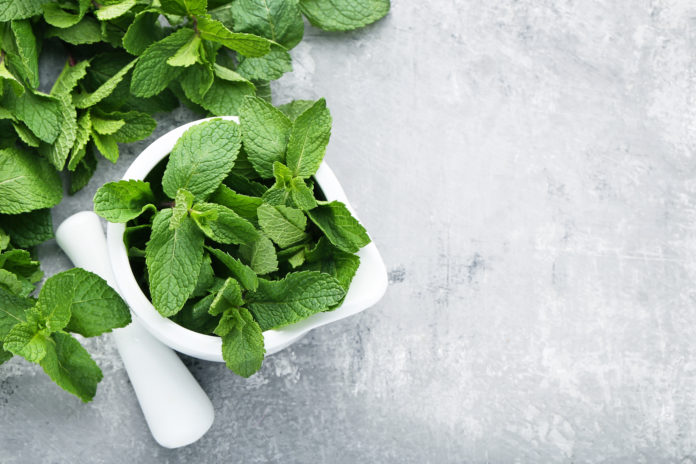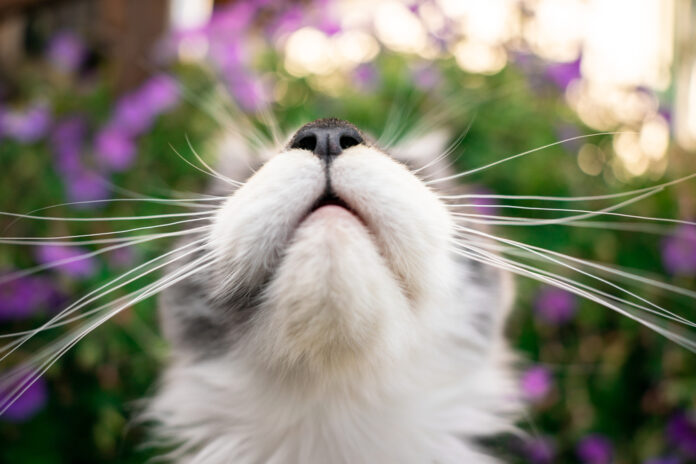Top 5 herbs for dog and cat digestive health

Digestive upsets are common in dogs and cats. These five herbs can effectively alleviate diarrhea, vomiting and constipation, and even treat deeper problems.
Occasional digestive issues are a fact of life in dogs and cats. Whether caused by a new food, a late night garbage raid, or those rich tidbits offered from the Thanksgiving dinner table, upsets are bound to happen. If a digestive ailment comes on suddenly and severely, or if minor symptoms like belching, flatulence or diarrhea persist for several days or recur often, then it’s time to see your vet. However, most forms of occasional digestive upset can be treated very effectively with a few herbs. Here are five of my favorites:
1. Fennel Seed (Foeniculum vulgare)
Fennel seed serves as a gentle anti-gas and antispasmodic agent that can be added directly to your animal’s food, bringing symptomatic relief while you and your vet look for the deeper cause of the problem. Fennel seed works to relieve gastric discomfort caused by foods your dog or cat shouldn’t have eaten.
- A cooled fennel seed tea works very well for this purpose — one teaspoon of fresh or dried seeds (fresh are better) in eight ounces of boiling water, steeped until cool. Give two to four tablespoons of the cooled tea for each 20 pounds of a dog’s body weight, or add it to drinking water, as generously as the animal will allow.
- A glycerintincture also works very well – give ten to 20 drops (more precisely, up to 0.75 ml) per 20 pounds of the dog’s weight (ten drops for cats), as needed.
Fennel is high in vitamins C and A, calcium, iron and potassium, and has varying amounts of linoleic acid. It is especially good for dogs and cats with chronic indigestion that cannot be attributed to a specific disease. Fennel also helps increase appetite, and freshens the breath through antibacterial activity in the mouth, and by minimizing belching.
2. Ginger (Zingiber officinale)
Ginger is perhaps the most widely used digestive aid in the herbal realm. Numerous studies support its longstanding reputation as a digestive tonic with amazing carminative (gas-reducing) and intestinal spasmolytic (cramp-soothing) properties. Ginger also aids in the production of bile and various enzymes in the gut, improving the breakdown of foods, especially fats.
As well, ginger helps regulate healthy gut motility, an attribute that has earned it a solid reputation as an effective remedy against nausea and motion sickness.
I find glycerin-based extracts of ginger especially effective for these purposes when combined with peppermint and fennel seed. Although I am a big proponent of liquid herb extracts, ginger can also be used effectively in its whole dry-cut form, or as a freshly-grated addition to food. One quarter of a teaspoon per pound of food is a good guideline to follow for either form. If you are opting for a liquid extract, follow the manufacturer’s dosing instructions.
3. Marshmallow (Althea officinalis)
Marshmallow contains mucilage, a slightly sweet, gooey polysaccharide compound with consistency of water-soluble motor oil. An alcohol-free extract or cooled infusion of marshmallow root can be used to coat intestinal mucosa with a slippery barrier that aids in stool transport while reducing inflammation.
This herb also has antimicrobial and immune-stimulating properties in the gut. Studies have shown marshmallow root extract to be active against Pseudomonas aeruginosa, Proteus vulgaris and Staphylococcus aureus — bacteria that can cause infections in the digestive tracts, urinary tracts, skin and ears of dogs and cats.
A marshmallow tea or low-alcohol tincture is usually the best choice. However, the dried or fresh root may be better for problems deep within the digestive system, such as colitis. This is because marshmallow’s mucilage is highly water-soluble and may not reach the lower end of the digestive tract unless carried there in a solid “container”, namely the chopped or ground root.
If you opt to use marshmallow tincture, make it doesn’t contain more than 20% alcohol. The mucilage constituents don’t take well to alcohol, and if too much is used in the tincture-making process, the end product may cause nausea. I like glycerin tinctures of marshmallow, not only for this reason, but because the glycerin itself adds soothing protective qualities to the medicine. Marshmallow “glycerite” can be squirted directly into an animal’s mouth — 1 ml (about 1/4 teaspoon) per 20 pounds of the dog’s body weight (less for cats), three times daily or as needed.
A tea can be made by steeping a teaspoon of dried chopped marshmallow root (or two teaspoons of fresh root) in eight ounces of very hot water. Stir the tea frequently until it has cooled to lukewarm. You should be able to feel the slippery-oily nature of the mucilage when you rub a few drops of the tea between your thumb and index finger. If not, add more marshmallow root. One teaspoon of the tea is a good starting dose for dogs. Cats will usually benefit from ½ teaspoon.
Marshmallow is also very good for lubricating and expelling hairballs, and will help relieve constipation. For this purpose, the dried powdered root can be added to a dog’s food at a rate of ½ teaspoon for each pound of food, once or twice daily. For cats, ¼ teaspoon should suffice, once or twice daily.
For problems very close to the rectum (such as a swollen anal gland irritated by bowel movements), a small gel cap might be necessary to carry the marshmallow root powder through the digestive tract to the problem area. Or, a small amount of cooled tea or glycerite can be administered as a suppository, using a soft plastic pipette or ear syringe
4. Mint (Mentha species)
Virtually any aromatic member of the mint family, such as spearmint, peppermint, catnip, bee balm or rosemary, will bring gentle carminative and antispasmodic relief to the digestive tract. My personal favorite is catnip (Nepeta cataria). In addition to easing the stomach, catnip serves as a mild sedative to help calm the nerves and promote restful sleep. Due to a constituent in catnip called nepeta lactone, cats may experience euphoria when they sniff the plant. However, the effect of the herb when ingested is relaxing in a different way — calming to the stomach and relaxing to the nerves.
Mints contain an assortment of volatile oil constituents that help relieve pain and pressure in the intestinal tract, and are very useful in animals that manifest their anxieties in the gut, such as the cat or dog that promptly hides and vomits when excitement levels get too high. Simply add ½ teaspoon of dried peppermint leaves (bulk tea) per pound of food or add mint to the water dish — just enough to lightly tint the water. Glycerin tinctures are effective too, especially when squirted directly into the mouth immediately after eating. Follow the manufacturer’s dose recommendations.
5. Slippery elm (Ulmus fulva)
My go-to remedy for diarrhea in dogs and cats, slippery elm bark contains a unique assortment of tannin and mucilage constituents for correcting a broad range of digestive ailments in animals. For diarrhea, enteritis, colitis and irritations of the stomach, the tannin components of slippery elm tighten digestive mucosa to reduce inflammation and inhibit the entrance of excess fluids into the intestines. At the same time, the slippery-oily mucilage constituents help lubricate the digestive tract to assist in waste elimination. In cases of constipation, slippery elm soothes, protects and lubricates mucous membranes, assisting and relaxing smooth muscles that have been working extra hard to eliminate waste.
Digestive enzymes, probiotics and prebiotic herbs
Some animals digest and utilize their food very efficiently, while others do not, especially seniors. Although nutrient absorption will improve with a high quality diet, the body will still need help through supplementation. Due to modern farming and processing methods, many foods are lacking the probiotics, enzymes and prebiotics needed to keep the digestive tract healthy and operating at peak performance.
- Digestive enzymes help catalyze the breakdown of foods into a form that can be readily utilized or eliminated by the body. Regardless of how good the food is, it must be properly digested. Otherwise, digestive issues like constipation and inflammatory bowel disease (IBD) can result.
I highly recommend a daily digestive enzyme supplement. Most contain multiple enzymes to improve digestion, such as:
- Protease — helps catalyze the breakdown of proteins
- Cellulase — breaks down cell walls of vegetables and grains
- Amylase — breaks down starches.
- Animals (and humans) also need probiotics — beneficial bacteria that help optimize digestion by supporting gut microflora. Look for quality brands that advertise billions of live organisms, derived from multiple strains of bacteria.
- A daily prebiotic is also a good idea. Generally speaking, prebiotics are starchy fiber compounds that are not digested or absorbed in the stomach, but instead go straight into the bowels where they ferment and selectively feed beneficial bacteria. The most notable prebiotic is inulin, a polysaccharide compound found in the roots of many plants.
Chicory root (cichorium intybus) is an inulin heavyweight; when dried it contains up to 18% inulin. Simply add a scant pinch of chicory powder to food at mealtimes, or use a prebiotic supplement and follow label instructions.



